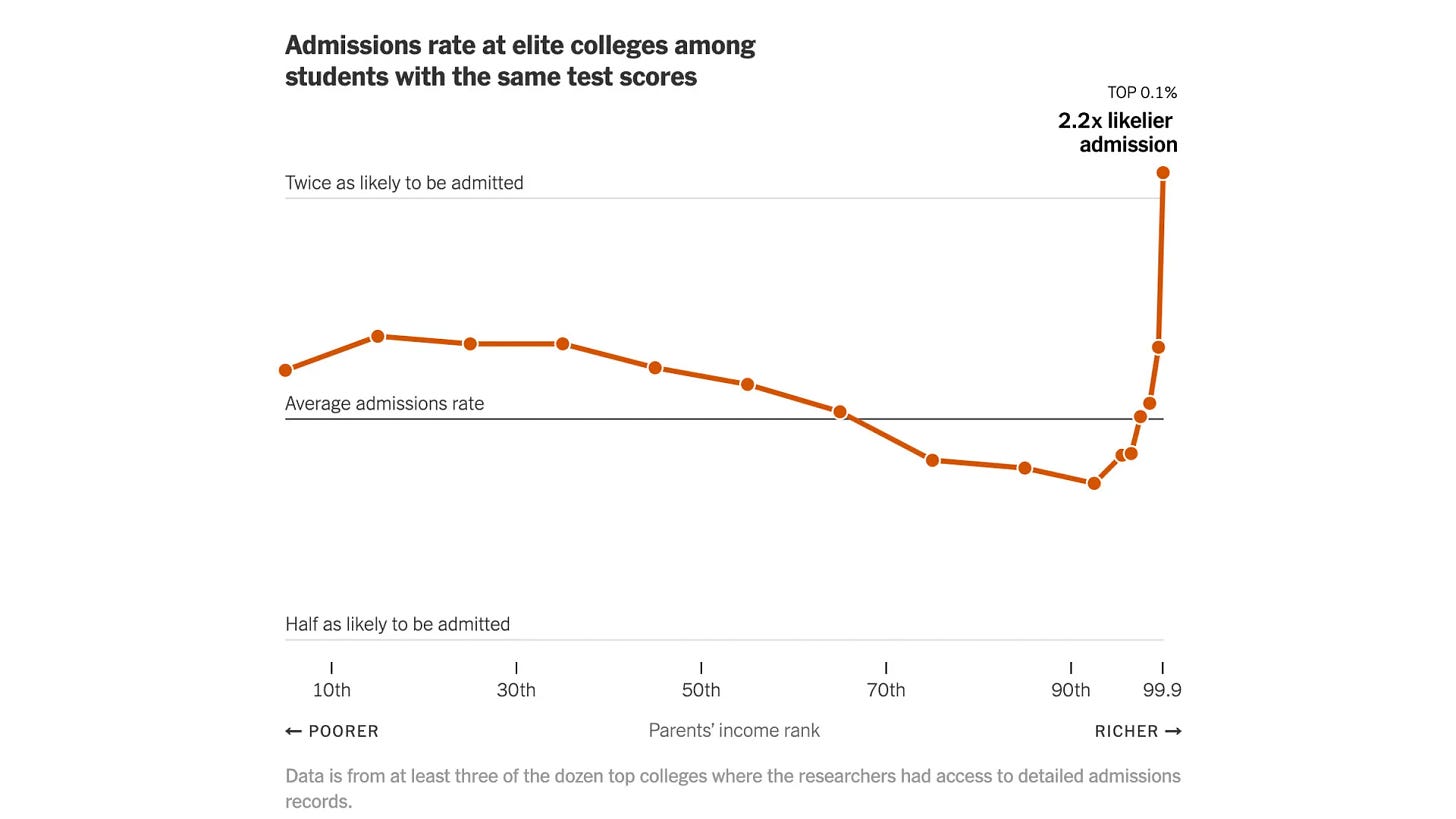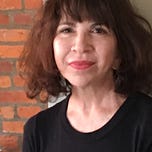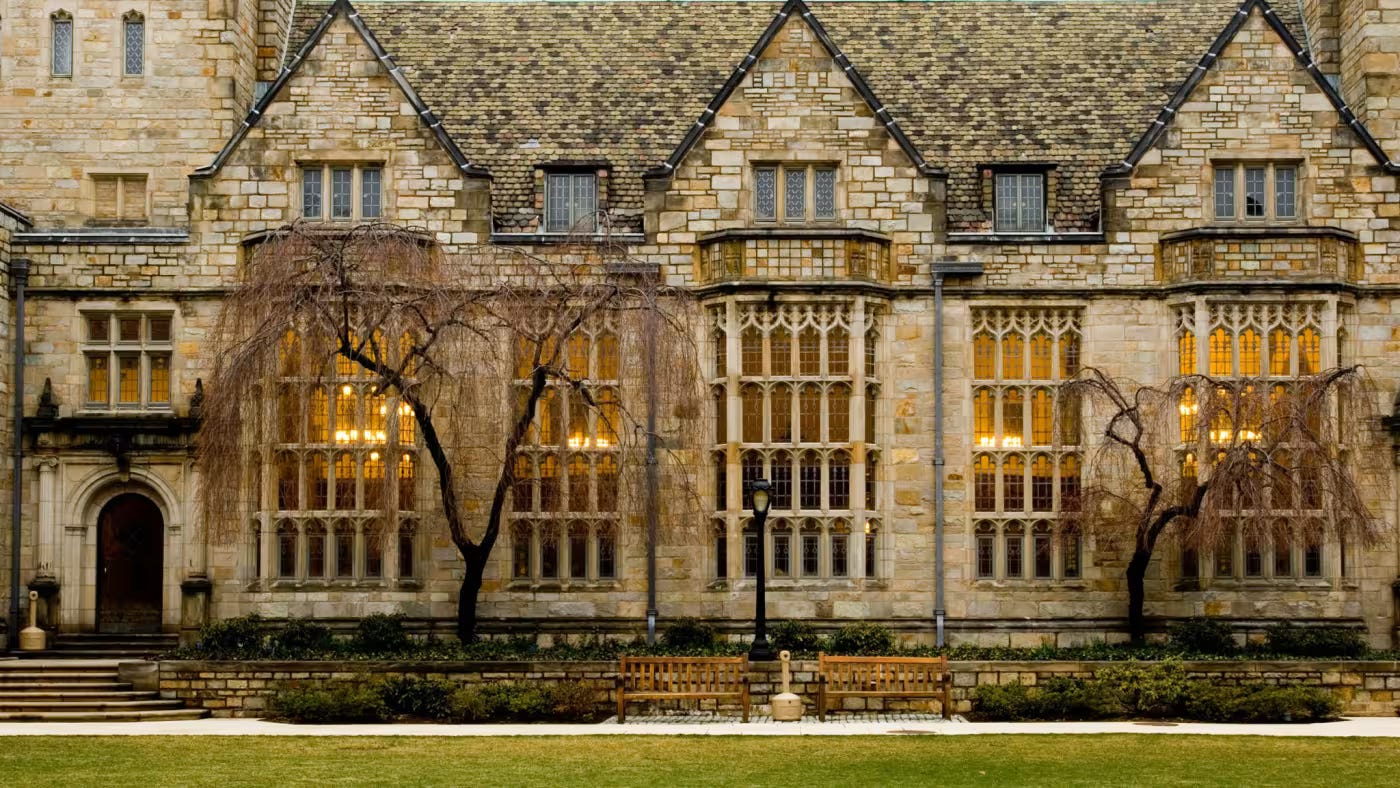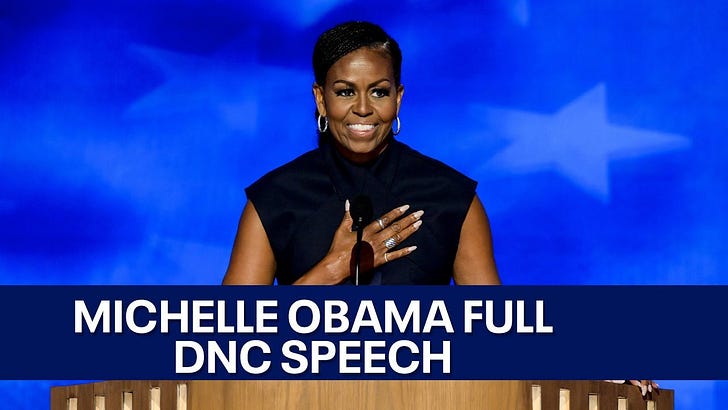This post goes out to both free and paid subscribers, but if you are not already a paid subscriber and value this effort and our growing community, please consider upgrading to a paid membership. Thanks in advance for your financial support of my work —it’s what allows me to keep researching and writing — not kidding!
“For applicants with the same SAT or ACT score, children from families in the top 1 percent were 34 percent more likely to be admitted than the average applicant, and those from the top 0.1 percent were more than twice as likely to get in.” The New York Times, July 24, 2023.
Maybe it’s because I still carry a chip on my shoulder that the recent report from researchers at Opportunity Insights, struck a disillusioning chord with me. I managed to attended a perfectly good public university, but as a teenager, I had grander plans for myself and my education. My father died suddenly at the beginning of my senior year of high school, just as we were talking about where I might attend college. In fact, it was the last conversation we had before he died of a heart attack the next day. As a reminder, in the 1970’s , living in a steel town and from a lower middle-class family, you weren’t prepped for college while still in diapers.
The only college application I made was to the massive public university a few hours away from my home because friends from my high school were going there, and I knew I could hitch rides home for the holidays. I also could get tuition and room and board paid in full through a work-study program, because after my father’s death our family had no income except Social Security. At the time I applied in early 1976, this university accepted everyone who graduated from an Ohio high school and was still breathing when they arrived on campus. If I knew enough at the time to apply elsewhere, could I have been accepted to an “elite”, private college, and if I had, would I have succeeded?
I’ll never know the answers to those questions, but what is important today is that students from low income backgrounds simply don’t have the same chance as the wealthy (generally defined as a family making $611,000 or more a year, and the ultra-rich or 1%, who earn millions or even billions each year) to attend a college with nationally and internationally known professors, smaller classes, more help to graduate and obtain an advanced degree, and eventually higher paying, more influential career opportunities. Although there is a small percentage of students from poor or middle class families admitted to Ivy League colleges, for example, this recent study shows it is a disproportionate share of the wealthy and ultra-wealthy students (with similar test cores as their lower income peers) who attend these colleges and reap the benefits.
The New York Times invites us to explore “How Income Influences Attendance at 139 Top Colleges”, based on a 2023 report prepared, of course, by Ivy League economists under the direction of Opportunity Insights., the non-profit mentioned above. The researchers conducted a broad review of anonymous admission data from these colleges alongside IRS tax information, and cross-referenced with SAT/ACT scores from 1999-2015.
The researchers wanted to answer these questions:
“ Do highly selective private colleges amplify the persistence of privilege across generations by taking students from high-income families and helping them obtain high-status, high-paying leadership positions, and whether changes to admission policies of these top institutions would lead to greater diversity of our leaders.”
Based on the following facts:
Leadership positions in the United States are held disproportionately by graduates of a small number of highly selective private colleges. Less than half of one percent of Americans attend Ivy-Plus colleges (the eight Ivy League colleges, Chicago, Duke, MIT, and Stanford). Yet these twelve colleges account for more than 10% of Fortune 500 CEOs, a quarter of U.S. Senators, half of all Rhodes scholars, and three-fourths of Supreme Court justices appointed in the last half-century (Figure 1).1 Ivy-Plus colleges also enroll a disproportionate share of students from high-income families: students from families in the top 1% of the income distribution are more than twice as likely to attend an Ivy-Plus college than students with comparable SAT or ACT scores from the middle class (Figure 2).
This is not a difficult report to read and understand and well worth your time, but the quick answers to the questions the researchers posed are “Yes” and “Yes”.
We conclude that highly selective private colleges currently amplify the persistence of privilege across generations, but could diversify the socioeconomic backgrounds of America’s leaders by changing their admissions practices.
The researchers pinpointed three reasons students from wealthy families were much more likely to apply to and be accepted at these elite institutions:
(1) preferences for children of alumni [legacy admissions], (2) weight placed on non-academic credentials, which tend to be stronger for students applying from private high schools that have affluent student bodies, and (3) recruitment of athletes, who tend to come from higher-income families.
“The persistence of privilege across generations” is an interesting way of saying “Keeping the rich, rich and the poor, poor”, and that is exactly what these longstanding admission practices do. Generally, if your parents attended an elite college, chances are you will, too. When top colleges give preference to legacy applicants are they influenced by the money your parents have already donated, the full cost of attendance your parents will pay without the need for pesky federal aid? And what about the continued amounts you will, in turn, donate to the college once you have achieved influence and wealth thanks to graduating from their elite college. Will you have a campus building named after you? Should whether your parents and/or grandparents attended a top tier college be a criteria at all in your acceptance?
Thankfully, the preference for legacy applicants have been dropped by a few colleges, like Wesleyan University in Connecticut and M.I.T. and Amherst Colleges, in the wake of the U.S. Supreme Court decision last year striking down affirmative action criteria in college admissions.
The economists also determined that colleges give extra weight to the type of high schools the student applicants graduated from in a round about way—college criteria for admittance often includes “non-academic” factors like extracurricular activities, recommendations and personal essays. The scores for this criteria typically are higher for private, non-religious high schools. So even if you live in an affluent neighborhood and send your children to excellent public schools funded by exorbitant property taxes, your children do not have the same “leg up'“ to attend a highly selective college as do students from private schools. 1
Comparing non-legacy applicants with the same test scores, demographics, and parental income, Ivy-Plus applicants who attend non-religious private high schools are twice as likely to be admitted as those who attend public high schools in affluent neighborhoods.
According to an article from Axios discussing this same report and referencing The New York Times article, this preference for the ultra-wealthy, legacy applicants and applicants from elite, private high schools (all of whom are disproportionally white) amounts to affirmative action for the wealthy.

It all comes back to money and wealth. Both government and the private sector, by their laws, policies and ways of thinking perpetuate both the cycle of poverty and the “amplification” of wealth and privilege — two sides of the same coin. This report and analyses lead me directly to student loan forgiveness, and to those who begrudge freeing a small portion of student loan debt in certain circumstances. Do you see how release of at least some student loan debt is an attempt to level the playing field and how much that forgiveness matters to students without the legacy of wealth?
_____________________________________
I’d love to hear your ideas on all of this, all sides. Please leave your thoughts in the Comment Section below to get the conversation started—thanks!
And as always…














Share this post